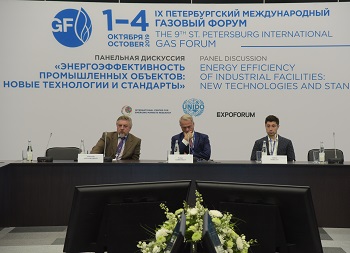
During the session Energy Efficiency of Industrial Facilities: New Technologies and Standards, arranged by Gazprom, UNIDO Centre for International Industrial Cooperation in the Russian Federation, the International Center for Emerging Markets Research and ExpoForum International, participants discussed economical efficiency of energy saving arrangements execution and introduction of energy management standards at the oil and gas facilities.
Sergey Korotkov, Director at UNIDO Center in RF, and Andrey Berezin, Development Director at the International Center for Emerging Markets Research, moderated the discussion. Svetlana Erkenova, National UN expert for industrial development at UNIDO shared some experience of the UNIDO Center in energy efficiency projects implementation and energy management introduction in Russia and across the globe. Alexander Antamoshkin, National UNIDO expert for energy management systems (EMS), spoke on the importance of EMS projects introduction under UNIDO procedures, and presented several implemented projects. Andrey Kozlov, CEO at Turboden RUS, and David Danesi, Project Manager at Turboden S.p.A., shared their experience of disposal technology introduction at the Oktyabrskaya Compressor Station. Alexander Burgardt, Vice President of Galaktika Corporation, spoke about digital solutions development for industrial safety and ecological supervision over oil and gas production facilities. Summarizing the results of the session, it can be concluded that using profitable technological solutions and implementing low-cost arrangements on energy management introduction can help reach energy efficiency targets nationally and enterprise-wide.
The total effect of introducing energy efficiency programs under UNIDO procedures in the Russian production exceeds 2.5 bln rubles. Industrial companies managed to save over 3 mln MW of electrical energy. This was announced on October 1 by Sergey Korotkov, Director at UNIDO Centre for International Industrial Cooperation in RF during his speech at the panel discussion Energy Efficiency of Industrial Facilities: New Technologies and Standards, arranged during the 9th St. Petersburg International Gas Forum that started its work at St. Petersburg. Participants of the event shared their experience on different projects implementation in this field.
"UNIDO procedures have been introduced by over 50 minor, average and large Russian companies. Due to that, enterprises managed to cut their emissions and energy consumption – electric power, gas, heat, water, and profited from it," said Sergey Korotkov.
Energy management under UNIDO procedures is a system of arrangements designed to systematically and consistently enhance efficiency of energy resources rational use and to reduce the environmental load, to extend life cycle of technological and energy equipment. This system is based on acquisition, procession and analysis of data on structures and scopes of energy consumption, as well as adjustment of technological and business procedures," explained Alexander Antamoshkin, National UNIDO expert for EMS. "Success of such projects implementation depends on how concerned the business managers are. Cutting energy and resource consumption brings economical effect on the 9th to 12th month."
As a good example of energy management system introduction, Alexander Antamoshkin referred to the Baltika brewing company, which saves up to 170 mln rubles annually thanks to rational use of energy resources. Another examples were the Ural Mining and Metallurgic Company (UMMC) and the Magnitogorsk Metallurgic Works, which save over 1 bln a year.
Participants of the panel discussion named another successful project in the field of energy efficiency – Gazprom’s initiative on greenhouse gases disposal. A pilot project at the Oktyabrskaya Compressor Station is undertaken by Gazprom transgaz Yugorsk LLC together with Turboden Rus (the Russian affiliate of the Italian supply company for renewable power generation equipment Turboden S.p.A.).
The solution under introduction will help to save up to 11 mln m3 of natural gas annually and reduce СО2 atmospheric emissions by 17 thousand tons. "This solution gas really great potential." said Andrey Kozlov, CEO at Turboden RUS. In terms of the entire Russia’s gas-transport system, which includes 254 compressor stations with total power of 47.1 thousand MW, it will be possible to save 11 bln m3 of natural gas a year, and to reduce CO2 emissions by 21 mln tons a year, which is 43% from the target value provided by Gazprom’s Concept. Thus, the gas concern will get economic benefit of over 113 bln rubles a year.
Reference:
UNIDO Center for International Industrial Cooperation in the Russian Federation as a part of the global network ITPO UNIDO (Investment Technology Promotion Office United Nations Industrial Development Organization) focuses on promotion of international, economical, technological, industrial and scientific activities.
United Nations Industrial Development Organization (UNIDO, ONUDI in French) ensures an international dialogue on industrial development. Its Headquarters is located in Vienne. In Russia, UNIDO implements programs on economical assistance in favor of modernization and competitive ability enhancement for innovative fields, corporate, average and minor enterprises, introduction of greenfield production technologies, as well as resource saving and energy efficient procedures.
In some of the projects, UNIDO acted as the executive technical agency of the Global Ecology Foundation. Reports and descriptions on the previous and current projects are publicly available, in particular, at the Center’s web-site www.unido.ru.
The UNIDO Center in RF, supported by representatives of the Russian Energy Agency, has implemented an international project "Development of market mechanisms for energy efficiency enhancement at energy intensive sectors of the Russian production."
Besides EMS, in compliance with the top and best global practices, UNIDO offers inspections and advanced training for technicians towards enhancement of the following industrial systems:
- draught equipment,
- vapour-condensation systems,
- pumps and hydraulic systems,
- compressed air systems,
- industrial electric motors,
- cooling systems.